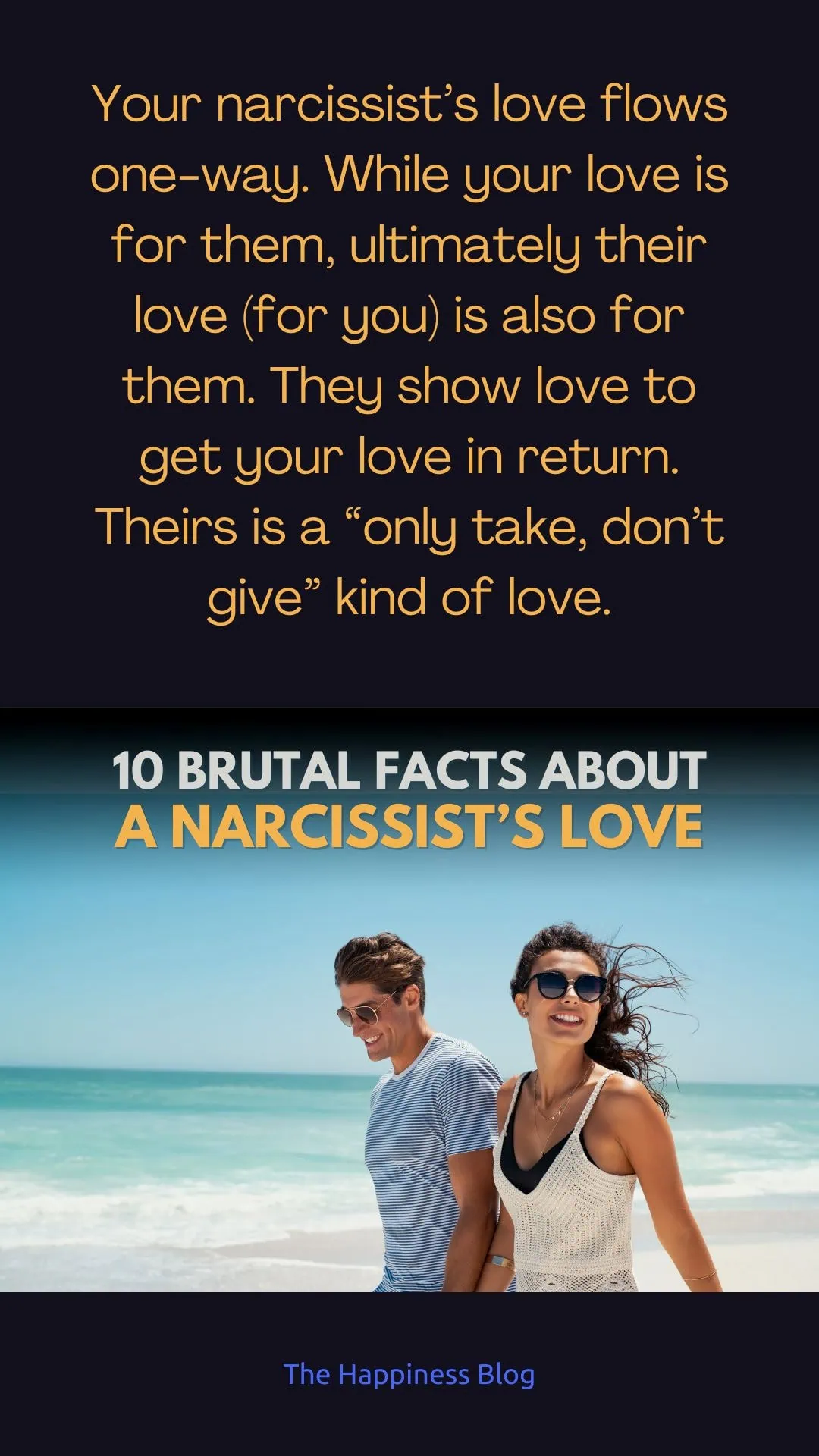Today's Monday • 10 mins read
— By Dr. Sandip Roy.
Narcissists and people diagnosed with Narcissistic Personality Disorder (NPD) have a vastly different view of love than the rest of us.
For us, love means caring, being there, and doing things for our loved ones without expecting much else in return.
Not for narcissists. Read on to know the nature of narcissistic love.
Can Narcissists Love?
Yes, narcissists can love, but this love is conditional and transactional. A narcissist’s love is a show to receive their “supply” in return, as validation, praise, or obedience. This love sustains only until the other person is useful to the narcissist.
The following is what a diagnosed overt narcissist wrote on Reddit:
“For me, love only exists if the relationship serves me. I can say ‘I love you,’ ‘I miss you,’ and I can give gifts or show effort (very seldom), but only if the person is entertaining me or giving me something I need. Faithfulness has never been part of the equation. One person bores me; it takes several, five, sometimes more, to keep me interested.”
So, narcissists can feel love, but it’s not the genuine and selfless love. Even worse, their lack of empathy makes it hard to imagine how someone could love without expecting anything in return.
10 Brutal Facts About Narcissistic Love (Q&As)
- How to tell if a narcissist loves you?
• Narcissists typically show their love by showering you with attention and gifts, idealizing you, and mirroring your interests and behaviors. They often remind you of the things they did for you out of love. - When does a narcissist know you love them?
• Narcissists test you to know if you love them. They will treat you with mild contempt, disregard, and coldness to see if you are still with them. If they find you trying to please them, it tells them they can control you from now on. - Can a narcissist fall in love permanently?
• They cannot love a person for long. Their love lasts as long as it fits their transactional definition of a relationship. The moment they feel they are giving more than receiving, they stop loving. However, they can get dependent on their partner and make their partner dependent on them (codependency), which may seem like long-term love. - Can narcissists love another narcissist?
• Narcissists can form relationships with other narcissists, but after the initial phase, they have an unhappy bond. Most such partnerships tend to be volatile, competitive, and envy-ridden. - Can narcissists love their children?
• Narcissistic parents treat their children as extensions of themselves, not independent people. Much of this parental love is conditional, based on the child meeting the narcissist’s demands. They also tend to take credit for their children’s achievements. - Can narcissists love animals?
• Narcissists have a “disaffectionate” love towards animals, typically conditional and self-serving. They often hurt their pets to test their loyalty and dependency. - Can narcissists love their parents?
• Narcissists may have a complex relationship with their parents, either idolizing or resenting them. - Do narcissists love narcissistic leaders?
• Narcissists often have a “cult-like” fandom for narcissistic leaders and influencers, putting them on a pedestal. They are known to troll those people who oppose or criticize their favorite leader. - Can a narcissist ever have a healthy relationship?
• A narcissist can have a good relationship if they work hard to behave better, go to therapy, and learn healthy social skills and meaningful ways to express love. But they will probably fall back into their narcissistic ways, so they need regular follow-ups. - Can narcissists be cured so that they can love normally?
• No, narcissists cannot be cured. Therapy can help them behave like normal people and express love, compassion, and kindness in healthy ways. Don’t be a fool to think that your love will fix them; this self-centered person can even gaslight their therapist.

Nature of Narcissistic Love
A narcissist’s love exists only as long as the person of interest gives them more than they invest.
And it comes with strings attached. When they lavish you with attention, gifts, and romantic gestures, remember, you have to pay them back with something they haven’t told you yet.
- If you do things to make your narcissist feel special or important, they will show you love and care.
- If you fail to meet their expectations, they can pull back, go silent, or turn on the rage button.
“I’ll be nice to you and show you love as long as you serve me.” — A narcissist’s unspoken words
- A narcissist’s love is based on grandiosity, egoism, greed, indifference, and self-gain.
- Narcissistic love expects admiration, validation, obedience, servitude, and loyalty in return.
- Narcissists in love don’t reveal their vulnerabilities out of fear that it might make them seem less powerful and less in control of the relationship.
In the end, you realize that a narcissist’s self-love will always be bigger than their love for someone else. That their “love” was to secure you as a narcissistic supply, meaning a provider of attention, praise, and service.

When you date a narcissist, they can make you feel like they are your soulmate. How do they do it?
- They reflect your dreams, aspirations, hopes, and desires, and even your dislikes and fears, as theirs.
- They project being someone trying hard to achieve success and happiness despite being hurt by others.
- They show empathy for your jagged edges and unhealed parts of you, so much so that it blinds you to their true self.
7 Reasons Narcissists Can’t Love Truly
Some of these reasons will heavily surprise you:
1. A narcissist’s love is one-directional.
Narcissists crave love, but their love is one-directional, flowing only to them. That means, while your love is for them, their love for you is also ultimately for them.
Their show of love is to get your love in return. Unlike a “give more than take” kind of love, theirs is a “take and only take” kind.
2. Their love is transactional love.
Narcissists expect you to put their needs over yours and serve them without question.
They will give you love as long as you satisfy their narcissistic supply needs. To keep you in line, they constantly criticize you for “disrespecting” the relationship.
3. They crave to boost their self-esteem (ego).
Narcissists use their “love” as a tool to bind you in the relationship.
It boosts their ego when you support their self-importance and entitlement.
4. Narcissists lack empathy and compassion.
Narcissists struggle to understand other people’s feelings and emotions. Their typical reaction to a friend’s success is that of jealousy and envy.
Since they are unable to feel the pains of others, it is difficult for them to build empathy-based bonds.
5. Narcissists are attention-hungry people.
Narcissists put their own egos above their partner’s well-being. And it’s more than being self-absorbed.
Their desperate craving for attention, admiration, and validation causes them to disregard their partner’s needs and problems.
6. They keep trying to manipulate you.
Narcissists use love overloading to lure you into a relationship by pretending to be in love with you.
They can trick you with fake stories of accomplishments. Once you fall for them, they gaslight you to keep control over you.
7. Emotional intimacy is hard for narcissists.
You can rarely expect to have an equal partnership with a narcissist.
Narcissists wear masks. They crave deep emotional connections but fear opening up their vulnerable side. You only get to have surface-level relationships with them.
12 Signs You Might Have Fallen For A Narcissist
- They are incredibly well-behaved in the early stages of romance and go to great lengths to impress you.
- They mimic your positive behaviors and expressions to manipulate you into believing they are likable.
- They have a lot of confidence in their abilities and love to be praised, often showering you with attention and gifts to earn your admiration.
- They do not take criticism or negative feedback well and may give a blank look when corrected.
- They, especially the grandiose ones, are egocentric, arrogant, aggressive, and exploitative, showing contempt for those they perceive as socially inferior. They often yell at others and can be harmful to your pets.
- They do not have many long-term friends, as people tend to avoid them. Narcissists are known to use manipulation and exploitation of others to achieve their goals.
- They have a sense of entitlement and expect special treatment from others, including unreasonable levels of respect, love, care, and attention.
- They bolster their fragile self-image with fantasies of success, power, beauty, or ideal love, believing they are special and unique. But deep inside, they suffer the shame of being mediocre and average.
- They crave constant admiration and expect you to praise them every time you talk to them.
- They rarely feel guilt, remorse, or regret after hurting or abusing others.
- They do not trust you entirely and are almost paranoid about signs of betrayal from you, often putting your trustworthiness to the test.
- They make excuses for their weird behaviors, often blaming you for their actions, and even using hostile behavior to get you to agree to their version of events.
Loving a narcissist can feel like a rollercoaster ride:
- Their sweet version of love can make you feel on top of the world. Their charm and love-overload are the first phase of their narcissistic abuse cycle.
- After the initial thrill, you feel confused as they replace their acts of love with neglect, insults, and contempt.
- Trying to please them is difficult, as they keep changing their expectations from the relationship, making you walk on eggshells around them.

How do narcissists show their love?
Some specific ways a narcissist shows their love for you: They
- Try to win you over with grand gestures, intense flattery, and excessive attention.
- Show extreme eagerness to spend time with you and lavish you with expensive gifts.
- Boast about their qualities and achievements, and are often given to humble-bragging.
- Present themselves as wealthy and successful people who can meet all your material needs.
- Do not support you during your difficult times, and may belittle your successes and awards.
- Can be very competitive, making you feel bad about yourself if you’re in the same field as them.
- View you as a tool to satisfy their entitlement since their relationships revolve around them.
A narcissist in love can make you think, “He has followed me across three continents to gift me a Gucci and a Rolex. I’d be a fool to turn him down.” With that, you are one step deeper into their world of abuse.
They instill a neediness in you known as narcissistic codependency. This makes it painful for you to choose between staying and leaving them.
It is so because they keep you tied in a trauma bond, which they create through occasional gestures of love in between abusive behavior.
“A narcissist in love is truly amazing, until it isn’t. At some point, they will dispute entirely. You cannot love the way that they love, and they cannot love the way you do.”
— PHILLIP JOHNSON, QUORA
Final Words
If you think a narcissist has fallen for you, it’s almost always a bad idea to fall for them. They require therapy, not a person willing to love them despite their nature.
Narcissists often target high-empathy people (popularly called empaths). They project themselves as emotionally hurt people. This makes the high-empathy person try to fix the broken narcissist.
Such relationships may seem mutually compatible. The narcissist provides security to the insecure empath, while the empath boosts the narcissist’s low self-esteem.
√ Also Read: 10 Safest Ways To Trick A Narcissist Into Telling The Truth
√ Please share this with someone.
» You deserve happiness! Choosing therapy could be your best decision.
...
• Disclosure: Buying via our links earns us a small commission.
